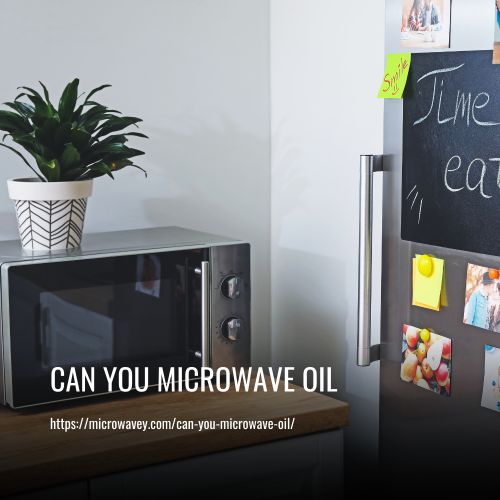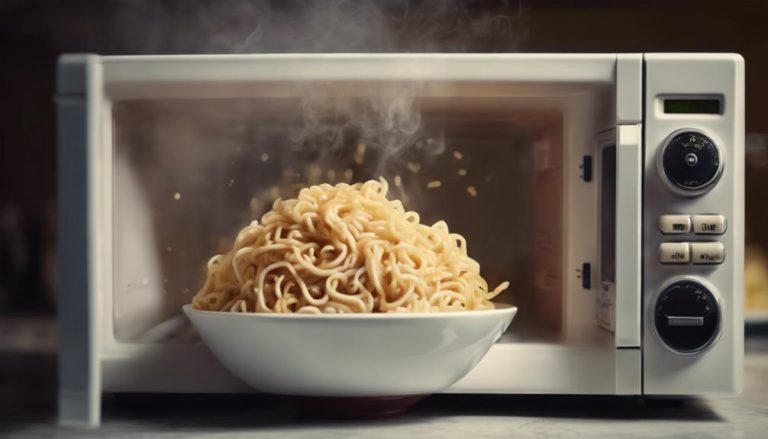Can You Microwave Oil?
Yes, you can put oil in the microwave. Make sure to use a microwave-safe container, such as a glass container or a microwave-safe dish. Cover the container with a microwave-safe lid or a piece of microwave-safe plastic wrap, leaving a small vent for steam to escape.

Can You Microwave Vegetable Oil
Yes, you can microwave vegetable oil. Transfer the oil to a microwave-safe container. Place a paper towel underneath the container to catch any spills. Make sure to use short intervals and stir in between to prevent uneven heating.
Can You Microwave Coconut Oil
Yes, you can microwave coconut oil. Coconut oil has a high heat capacity and stable temperature. To microwave coconut oil, transfer the desired amount into a microwave-safe container. Microwave it in short intervals of 15-30 seconds, stirring in between, until it melts.
Can You Microwave Essential Oils
Yes, you can microwave essential oils, but it’s important to do so in small quantities and for a short amount of time. The oil itself doesn’t absorb microwaves, but the dish you put it in will heat up and transfer the heat to the oil.
Can You Microwave Massage Oil
Yes, you can safely heat massage oil in the microwave. To do so, transfer the massage oil to a microwave-safe container and cover it with a microwave-safe lid. Heat the oil in short intervals, such as 30 seconds at a time. Make sure to stir the oil between intervals to distribute the heat evenly.
Can You Microwave Olive Oil
Yes, you can microwave olive oil in small quantities as part of a recipe. Just make sure to heat it gently and be careful not to overheat it.
Is It Safe To Microwave Oil
Yes, it is generally safe to microwave oil. However, there are some important things to keep in mind. When microwaving oil, make sure to use a microwave-safe container that can withstand the heat. It is also important to cover the container with a microwave-safe lid or a piece of microwave-safe plastic wrap to prevent any splattering.
Additionally, avoid overheating the oil as it can become extremely hot and potentially cause burns. It is recommended to microwave oil in short intervals, stirring in between, to help distribute the heat evenly and prevent overheating.
Always use caution when handling hot oil and make sure to use oven mitts or potholders. Overall, microwaving oil can be a convenient way to heat it, but it is important to be mindful of the precautions and follow safe cooking practices.
Will Oil Explode In The Microwave
No, the oil will not explode in the microwave. To safely heat oil in the microwave, use a microwave-safe container and cover it with a microwave-safe lid or a paper towel. This will prevent any splattering or overheating.
It is recommended to heat the oil in short intervals, stirring in between, to ensure it heats evenly. Always be mindful of the oil’s temperature and use oven mitts or gloves when handling the container as it can be very hot.
Can You Heat Up Oil in The Microwave
It is not recommended to heat oil in the microwave. Oils have a specific smoke point, and heating them beyond that point can cause them to lose their nutritional benefits. Oil does not heat easily in a microwave, and it is usually the container that gets heated first and then heats the oil. It is best to avoid heating oils in a microwave.
How to Heat Oil in The Microwave
It is essential to take proper precautions to ensure safety and avoid potential risks. Here’s how to heat oil in the microwave:
1. Choose the Right Container
- Use a microwave-safe container that can withstand high temperatures.
- Opt for a glass or ceramic dish rather than plastic, as it can melt or release harmful chemicals.
2. Microwave in Short Intervals
- Heat the oil in short bursts, such as 30-second increments, to prevent overheating.
- Stir the oil after each interval to distribute the heat evenly and check its temperature.
3. Use a Microwave-Safe Cover
- To prevent oil splatter and maintain a stable temperature, cover the container with a microwave-safe lid or paper towel.
4. Monitor the Oil’s Temperature
- Do not overheat the oil, as it can reach its smoking point, produce toxic fumes, and even catch fire.
- Aim for a temperature that is warm to the touch but not excessively hot.
5. Allow for Cooling Time
- After microwaving the oil, let it sit for a few minutes to cool down before using it in your recipe or handling it.
Safety Tips When Microwaving Oil
Microwaving oil can be a quick and convenient way to heat it up for various purposes, such as cooking or even making beauty products. However, it’s crucial to prioritize safety when using the microwave to heat oil. Here are some essential safety tips to keep in mind:
- Choose the Right Container: Select a microwave-safe container that can withstand high temperatures. It’s best to use a glass or ceramic dish rather than plastic, as plastic containers can melt or release harmful chemicals when exposed to extreme heat.
- Use Short Intervals: Avoid overheating the oil by microwaving it in short bursts. Heat it in increments of 30 seconds, then stir the oil after each interval. This helps to distribute the heat evenly and allows you to monitor the oil’s temperature more effectively.
- Cover the Container: When microwaving oil, use a microwave-safe cover or cover the container with a paper towel. This helps prevent oil splatters and keeps the temperature stable.
- Monitor the Oil’s Temperature: It’s important to be mindful of the oil’s temperature to prevent it from reaching its smoking point, which can be dangerous. Aim for a temperature that is warm to the touch but not excessively hot. If the oil starts to smoke, immediately stop microwaving and remove it from the microwave.
- Allow for Cooling Time: Once you have finished microwaving the oil, allow it to cool down for a few minutes before using it or handling it. This will help prevent any accidental burns or injuries.
Remember, microwaving oil can present some risks, so it’s crucial to always practice caution. Following these safety tips will help ensure that you can microwave oil without putting yourself or others at risk.
FAQs
The recommended time for microwaving olive oil is typically around 15 to 20 seconds at a time. It is crucial to frequently check and stir the oil during the microwaving process to prevent it from getting too hot or reaching its smoke point.
Yes, microwaving olive oil can change its taste. When olive oil is heated in a microwave, the electromagnetic radiation causes the water molecules within the oil to vibrate and generate heat. This can lead to the breakdown of the oil’s fatty acids and alter its flavor profile.
Olive oil is generally safe for heating in the microwave. When heating oil in the microwave, the oil can reach its smoking point, which can produce toxic fumes and degrade the quality of the oil.
There is no evidence to suggest that heating extra virgin olive oil causes cancer. Extra virgin olive oil has a high smoke point and is generally stable when heated. However, it is important to not overheat the oil, as this can lead to the release of harmful compounds.
There are certain oils that should not be heated in the microwave. Oils that have a low smoke point, such as extra virgin olive oil, should not be heated in the microwave as they can easily reach their smoke point and release toxic fumes. Other oils that should be avoided when heating in the microwave include oils with a high polyunsaturated fatty acid content, such as flaxseed oil and walnut oil, as they can become rancid when exposed to high temperatures.
Conclusion
In conclusion, while microwaving oil may seem like a convenient option, it is best to avoid doing so. The potential risks and dangers outweigh the convenience factor. It’s always better to use alternative methods like stovetop or oven heating to ensure the safety and quality of your oil. Remember, it’s better to be safe than sorry when it comes to your health and kitchen experiments!





